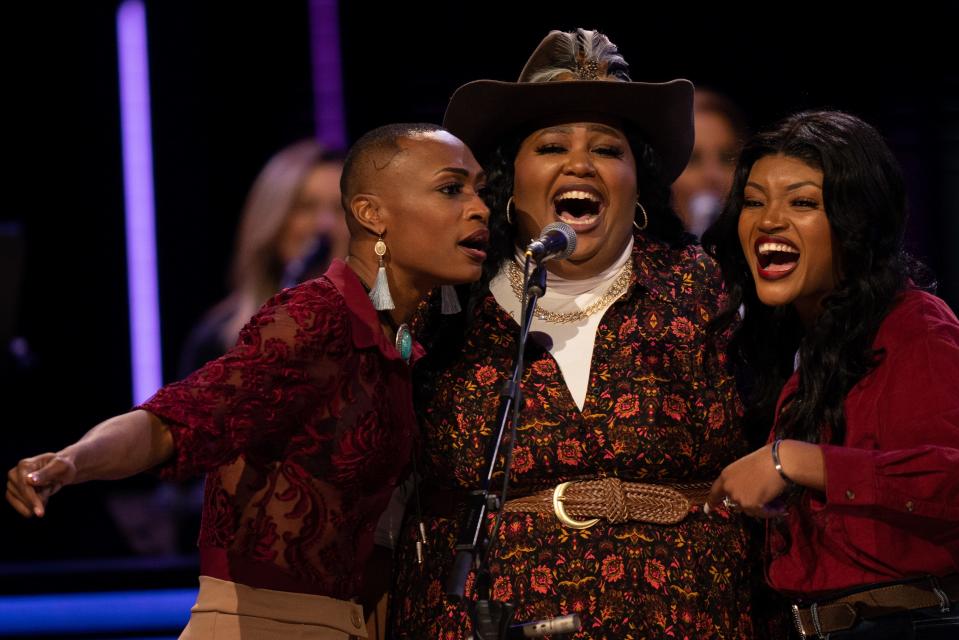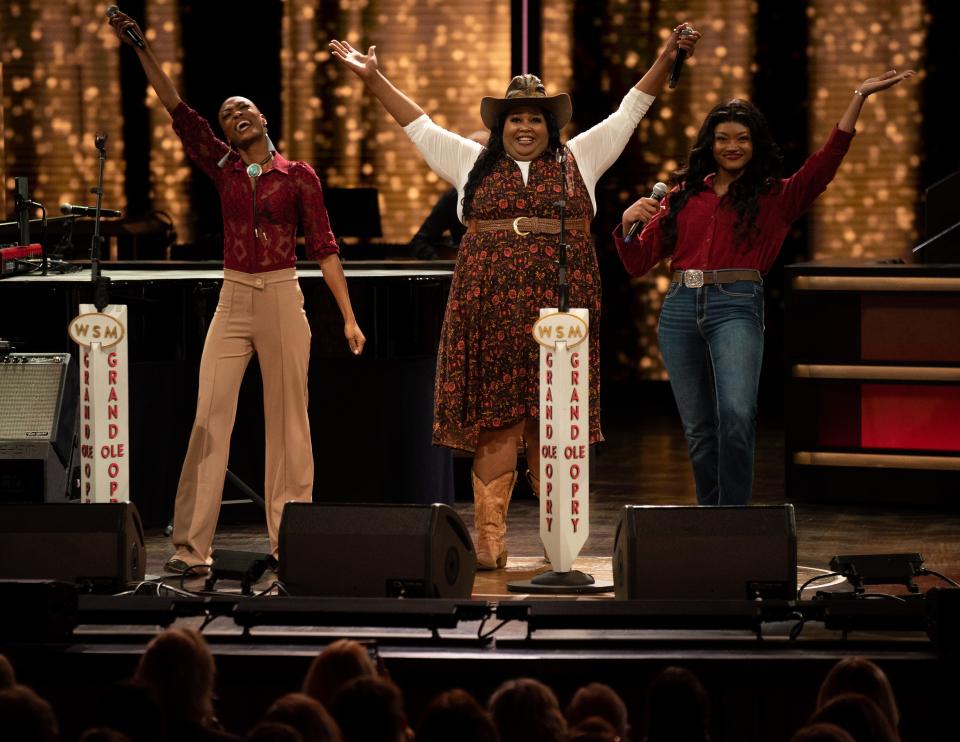Blue collar roots thriving: Chapel Hart at crossroads of country's mainstream growth
Last year saw Chapel Hart attempt to course-correct one of country music's fundamental flaws. But in the process, the group just may have shattered.
In the past three years, as the country music industry grappled with social issues, America's economy faltered. And the African-American female country trio of Danica Hart, Devynn Hart and Trea Swindle's family-borne, traditional country harmonies was caught in the undertow.
This story, one of three Tennessean features on artists left on the fringes of country music's latest evolution, examines how country's growth past its blue-collar fanbase uniquely impacted Chapel Hart.
Chapel Hart surges ahead, falls behind
Chapel Hart made 160 domestic performance dates and global festival appearances in 2023. The year also saw them release an album and earn praise from Country Music Hall of Famers Dolly Parton, Marty Stuart and Tanya Tucker.

They were also seen regularly on national television, heard by one million unique listeners on streaming platforms, crossed the threshold of over 100,000 engaged fans on social media and made nearly a dozen appearances on the Grand Ole Opry stage.
However, on Nov. 12, 2023, the trio posted a bittersweet, stunning and hour-long Facebook video announcing that they were "no longer competing" in country music's mainstream industry.
Among many statements, Chapel Hart's Danica Hart stated the following:
"We're trying our very best to keep up with those...on a record label. And in a way I feel like we've done pretty well because our names are in conversations. Every single person [it seems, knows who Chapel Hart is, but]...we still don't have a record deal, we still don't have a publishing deal, we still don't have sponsorships, and we're still out here busting our tails. We're so busy trying to keep up in an industry that isn't even acknowledging us when we could be doing the things that really make our hearts happy. We're not here to play fame. We're not here to get famous. We're here to serve the people."
Country's blue-collar, middle-class problem
The Tennessean caught up with Chapel Hart as the trio from Poplarville, Mississippi, were performing their annual Christmas concert at Gallatin, Tennessee's intimate, almost 200-year-old Palace Theater.
Chapel Hart hails from Poplarville, a Mississippi city of less than 3,000 residents where a quarter of the population exists beneath the poverty line.

It's similar to HARDY's hometown in Philadelphia, Mississippi, and numerous other small cities with a significant population of blue-collar-employed residents nationwide.
Cities like these comprise a significant portion of Chapel Hart's core fanbase.
In places like these, Family Dollar and Dollar General share the same stretch of highway as five different national chain fast food restaurants, a campground, and the community college next to the car repair garage and family farm.
Also in places like these, country music is popular among Americans with blue collar realities and white collar aspirations.
Perception is not reality
Pew Research Center polls conducted in 2021 show that the number of Americans who perceive themselves to be middle-class has dropped 10 percent from -- roughly 60 to 50 percent -- between 1971 and 2021.
However, perception is not reality.

2021 Urban Institute research data shows that 31 percent of America's homes are actually middle class.
In the decade that Chapel Hart has existed, places like Gallatin -- located 45 minutes north of Nashville -- have become the hub of the group's success. These are towns where venue promoters have sought to book the trio in 1,000-1,500 capacity rooms.
However, for a fanbase comprised mainly of people for whom $50 tickets for what ultimately equates -- with dinner, merchandise purchases and parking -- as, conservatively, a costly $300 night on the town for a family of two or three, the ask was too great.
On average, Chapel Hart drew roughly 400 people to live shows they headlined in 2023.

By comparison, numerous Nashville acts who eventually become arena and stadium openers appeal to a different socioeconomic crowd and routinely pack out venues like Music City's 500-capacity EXIT/IN and 1,200-capacity Brooklyn Bowl at similar ticket prices.
Where and how does an act like Chapel Hart scale and maintain its presence and reach?
Beyond the 'mainstream fad'
"It feels like the race that [Chapel Hart] is being assigned to run is rooted in a style of country music that will exist long after the genre could exist as a mainstream fad," says group member Devynn Hart.
"Fans whose personal integrity is tied to what country music has historically represented probably haven't been to an arena or stadium to see a country music concert in 30 years but want to take their families to an amphitheater or smaller venue," adds Trea Swindle.

Country music's popularity may be at an all-time high, meaning its community-driven core, driven by intimate, regular live performance interactions, is on the outside looking in at unprecedented success.
Danica Hart cackles when asked where Chapel Hart is likely heading back to redouble their engagement with their fanbase as they chart their next steps.
"I'll be in Dollar General or Walmart in a CMA Awards or Grand Ole Opry-ready ball gown buying false eyelashes while signing 1,000 autographs."
"We're the women who, as little girls, took our grandmother's good material to make ball gowns to pretend like we were walking down the red carpets for events that we're now regularly invited to and appearing at," she continued. "Country music has aided us in getting over every heartbreak in our lives -- those caused by country music now included."
This article originally appeared on Nashville Tennessean: Chapel Hart struggles against country's move from blue collar roots
